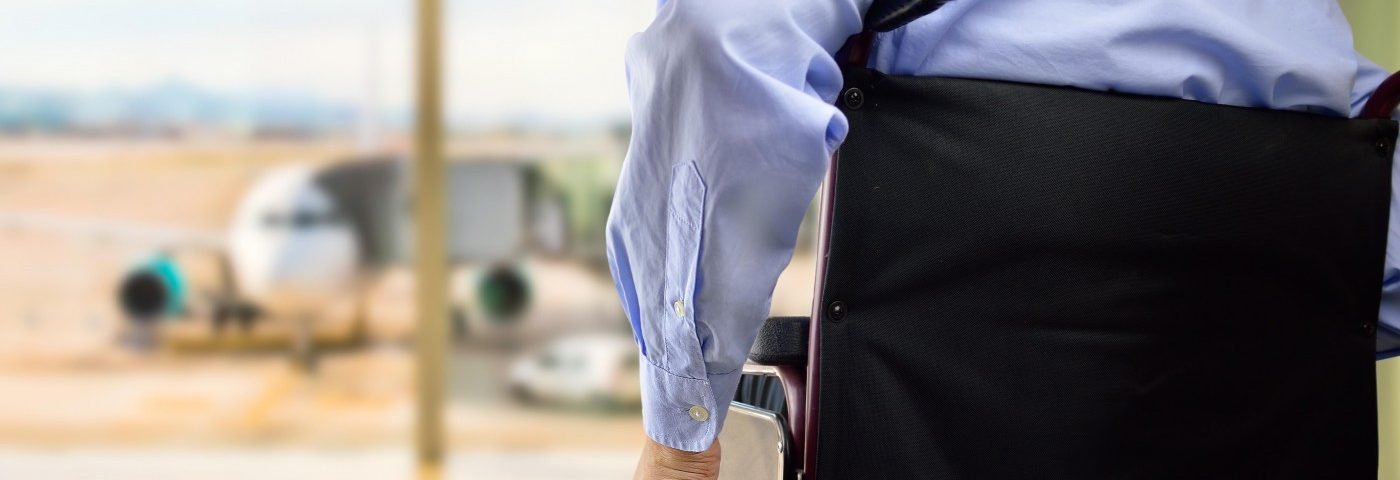How a New Federal Law Could Make Flying Easier for People with Disabilities
Written by |

“Well, I certainly hope this little incident hasn’t put you off flying, miss,” says Christopher Reeve in the 1978 “Superman” film. “Statistically speaking, of course, it’s still the safest way to travel.” Well, if you’re Lois Lane and the Man of Steel comes to your rescue when you fall out of a damaged helicopter, that statement may be true. For people with disabilities, however, flying is a bit more difficult and risky.
One of the most daunting risks that a wheelchair user faces every time they board an airplane is the uncertainty of whether the airline will handle their wheelchair properly. Given that airplane design doesn’t allow for wheelchair users to remain in their chairs, the devices have to be stored underneath the planes. Confined within these tight spaces, chairs are susceptible to severe damage and are often poorly handled by airline personnel. You can read about just a few of these horror stories in this piece from The Guardian.
However, a new federal law which falls under the Federal Aviation Administration (FAA) could drastically improve flight accommodations for wheelchair users in the United States. Thanks to the efforts of Sen. Tammy Duckworth, a Democrat from Illinois and disability advocate, this legislation requires airlines to report damaged or lost wheelchairs and scooters.
Interested in SMA research? Check out our forums and join the conversation!
The veteran, who had both of her legs amputated during the war in Iraq in 2004, uses a wheelchair full time. She’s also no stranger to issues with flying since being nonambulatory and has had two wheelchairs break during flights between Washington and Chicago O’Hare International Airport.
“My wheelchair is my legs, and it can’t be easily substituted,” she told Daily Herald.
This is a great step toward making travel more accessible, and Sen. Duckworth deserves all the praise for pushing this initiative forward. Still, I propose more action once these reports start coming in later this month. While those of us with disabilities are expecting these numbers to be high, I imagine that the majority of the able-bodied population will be quite shocked at the extent of this problem.
For those in Washington who are listening, here are my suggestions for how to further advance Sen. Duckworth’s mission:
Coordinate a panel in D.C. on this subject
While I’m beyond grateful that Sen. Duckworth made her voice heard, Congress needs to hear from many other people with disabilities. I propose that the senator should help to facilitate a panel of Americans with disabilities to talk directly to Congress and the FAA about their experiences with flying. This panel should be diverse, comprised of paralytics and amputees, and include those who live with rare diseases like SMA and cerebral palsy.
Impose stricter regulations on how airlines handle wheelchairs
Once these airlines do send in their reports of how many wheelchairs and scooters they’ve either damaged or lost, they need to reevaluate how their employees handle chairs. These reviews should identify how airline employees are damaging or losing track of chairs and develop solutions to stop this from happening.
Airlines should work with engineers to allow people to remain in their wheelchairs during flights
Maybe I’m too much of an idealist, but I don’t think it’s unreasonable for airlines to at least consider this as a possible solution. If I can have a robotic arm mounted to the side of my wheelchair, surely there’s someone out there who can figure out how I can stay in my chair on an airplane. We’re in the year in which “Blade Runner” takes place, for crying out loud!
This summer I’ll be flying to Anaheim, California, with my parents and caregiver for the 2019 Cure SMA conference. It will be my first time flying since I was 7 years old, and it would be an understatement to say that I’m nervous about the airline employees handling my chair correctly. I hope that Sen. Duckworth’s efforts to improve flight accommodations and this new law will be a major wake-up call for airlines across the nation. This is a monumental step, but it’s just the beginning.
***
Note: SMA News Today is strictly a news and information website about the disease. It does not provide medical advice, diagnosis, or treatment. This content is not intended to be a substitute for professional medical advice, diagnosis, or treatment. Always seek the advice of your physician or other qualified health provider with any questions you may have regarding a medical condition. Never disregard professional medical advice or delay in seeking it because of something you have read on this website. The opinions expressed in this column are not those of SMA News Today, or its parent company, Bionews Services, and are intended to spark discussion about issues pertaining to spinal muscular atrophy.








Leave a comment
Fill in the required fields to post. Your email address will not be published.